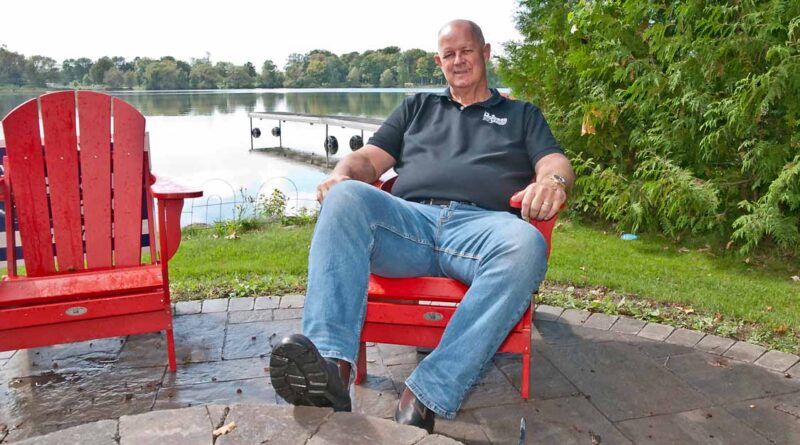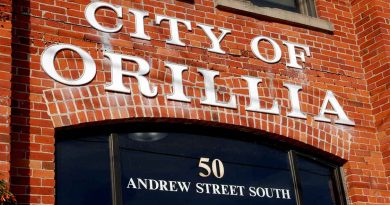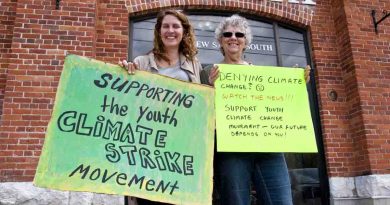Family Tradition; Mayoral Candidate Profile
By John Swartz
As with every election, SUNonline/Orillia profiles candidates for office. In the case of holding the mayor’s office in Orillia, this leadership position is different than those of council. Despite having an equal vote, being the leader of council and therefore the community along with some responsibilities beyond those of other council members, raises the significance to a level a profiles are warranted.
Each of the three candidates were contacted by email with an outline of the discussion so there voters could compare answers. They were also contacted by phone for a sit down discussion of the same issues generally being talked about and issues we feel should be talked about.
Only Don McIsaac arranged to meet with SUNonline/Orillia and here is the result of the meeting.
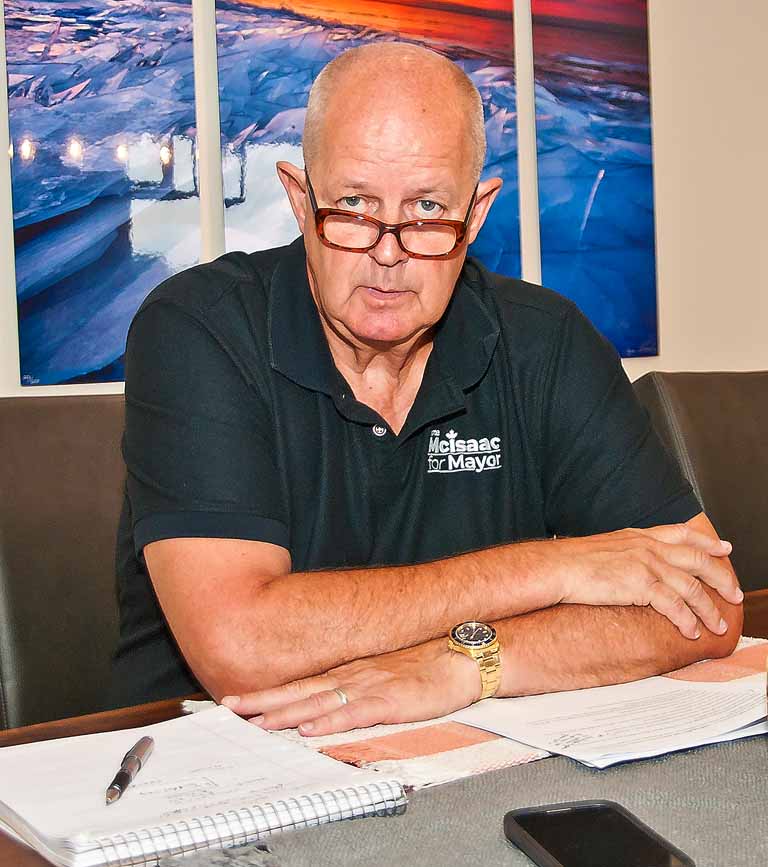
“Orillia’s my home. I was born here, raised here, played hockey here, flipped burgers at Weber’s, went to school here. I was one of seven children. My wife and I also have seven kids,” McIsaac said.
For new residents, having a McIsaac as mayor or councillor is not a new thing in Orillia.
“Dad was mayor in 1969 and mom was mayor from ‘83 to ‘85 and they were both actively involved with council prior to that and in mom’s case after that as well,” McIsaac said.
Surely there must have been some interesting discussion around the dinner table, given mom and dad’s involvement politically.
“There was some fairly active discussion and we also used fight for the Packet & Times, who would run downstairs, grab the paper and read it first. We were always interested in the news and events. It was great place to grow up. If you had an idea, be prepared to have it challenged and you had various inputs from people and I think it helped me develop,” McIsaac said.
“My first job out of school I was at a soap and detergent plant they (Canada Packers) had. I was really excited, I had just gotten a BA in history and I thought great. I talked to the plant manager – “How come you hired me?” (He said) “I hired you because you worked at McNab’s Hardware when you were a kid and I think you know about pipes, valves and fittings.” So it had nothing to do with my history degree and everything to do with something I did when I was 12-years- old,” McIsaac said.
His first job at Canada Packers took him on a different journey away from using his history education.
‘That got me into the accounting side and I got excited about accounting. I received my CMA designation and it opened up a lot of doors,” McIsaac said. This lead to a string of jobs: Dresser Industries and KFW in Orillia, back to Canada Packers in Toronto, West Bend in Barrie, Militia Coffee in Toronto and PACCAR in Windsor.
“They (PACCAR) were the ones that asked me to go to the States,” he said. “My wife and I decided that for a career it would be best to try the United States.” He wouldn’t be home, except for visits until retirement last fall.
“I got a green card and I thought, “We’re staying.” We kind of moved around. I got into re-structuring businesses where you have companies that are in trouble with the bank and you’ve got 30 days, 60 days to figure it out or we’re going to close the thing,” McIsaac said. He told an anecdote of the kind of re-structuring work he did, which is more like saving companies from extinction.
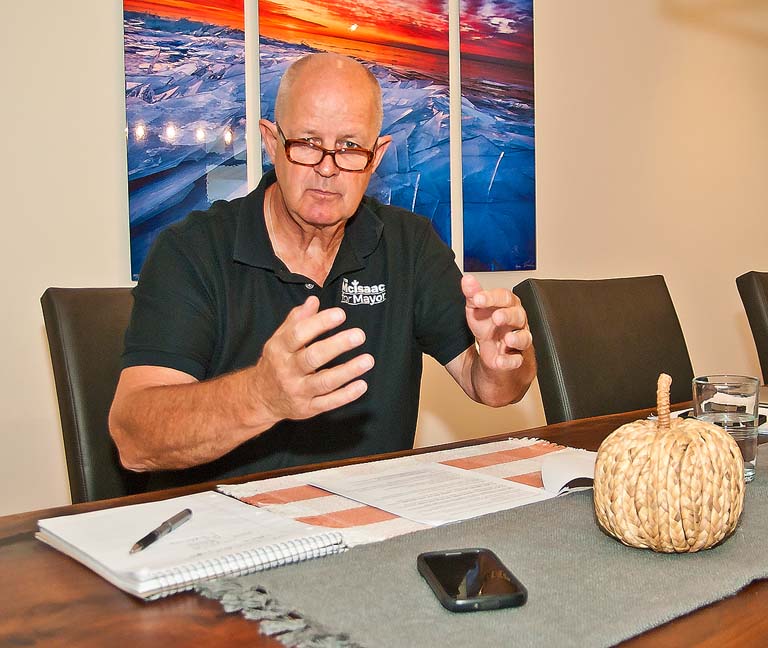
“I had one guy, I was supposed to start Monday. The guy called Thursday afternoon and said, “Don’t pack lunch. The bank’s coming in Monday, they’ll probably close up, there won’t be much of a job,”” McIsaac said.
“Great. What time are they coming?” he asked.
““Nine o’clock.” I got there at 7, took a couple hours and told them, “I need an hour, just sit tight, don’t do anything,””
“At ten o’clock I said, “Look, we can make this work, here’s how.””
“They gave us two weeks. The hook I got them on was they had millions of receivables, if they shut the place no one is going to pay the bills. They took that, we collected some cash; I gave people discounts for paying early. We got the money and two weeks later they said we can have another month. So we made it.”
From there he forged a career as a hired gun to turn companies around.
“It was making tough decisions. You’ve got to build a team. You’ve got to make sure the right people are in the right spot, doing the right thing and they all understand the mission,” McIsaac said. these weren’t mom and pop businesses either.
“Most were a couple hundred million (valuation). One of them, most recently, when I started out started out they were about $300 million and when I finished they were about $1 billion, so fairly sizable. When I was at Textron they were a couple billion,” McIsaac said. And it wasn’t all about reading a balance sheet and juggling numbers.
“I learned long ago, if you are a hammer everything’s a nail. I’m a CPA so a lot of things are data. That is sometimes the solution to the problem, but not always. You need to understand that maybe data isn’t the solution to the problem and there are other ways to solve the problem,” McIsaac said.
As an aside, SUNonline/Orillia asked if there was a course in comedy for accountants since the experience is accountants are often the last to recognize a joke. The answer revealed something unexpected.
“No, I had done standup humour before, and like my hockey career it ended fairly quickly. If you think about it, if you ever wrestled in high school, wrestling for three minutes, or boxing for three minutes, try and do that. You try and do three minutes of comedy, it’s tough stuff, it’s hard. I was never really paid more than a couple beers for it, but I would go to open mic nights and try it. It helps me. Humour is a tool for me because it disarms things. Say we have a tough conversation, I make a joke about it, it gets you at ease, gets you laughing. We can still deal with the problem, but we can have a laugh about it and move forward,” McIsaac said. That stage experience must have turned out to be handy entering the political ring, being able to speak in front of an audience.
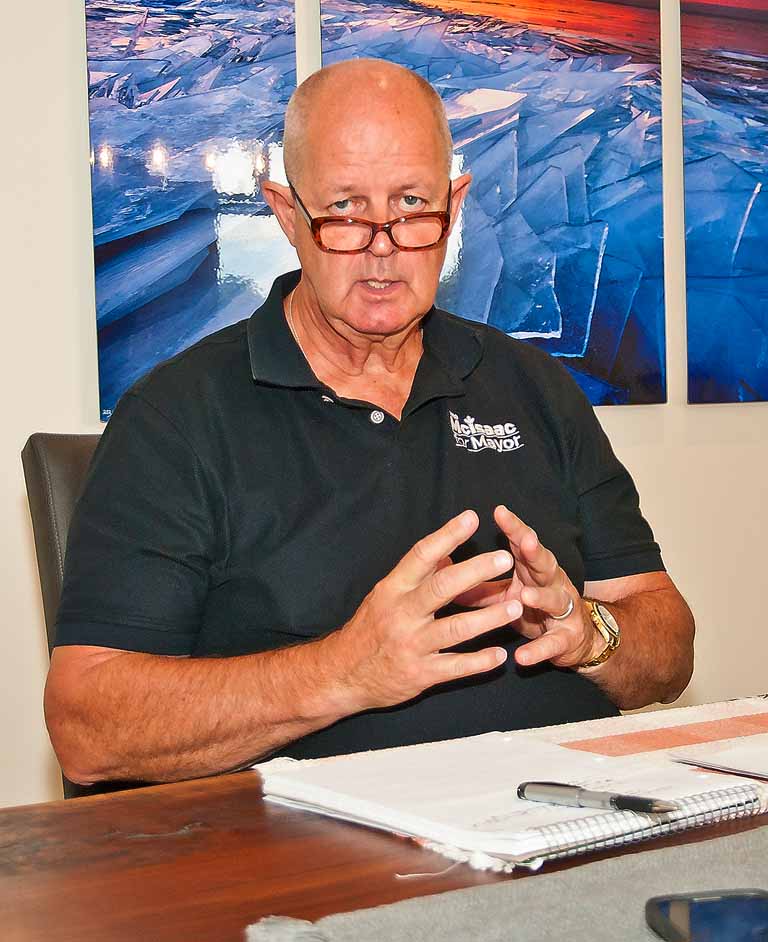
“If you give me a speech that’s written I am terrible, but if you just say talk about your four priorities, it’s like – hey, here’s what they are,” McIsaac said.
Since he’s returned to Orillia he’s joined the chamber of commerce and the legion. He also participated in a few fundraising efforts.
“I did Walk the Plank and raised $1,700. I raised over a thousand bucks for Terry Fox, and with a team I did the PSCI Reunion ad we had 300 people and we made $2,500 and that went to the Sharing Place, Samaritans Purse, Jubilee House,” McIsaac said.
A carry over form this process from one election to the next is asking how candidates inform themselves when confronted with issues they aren’t familiar with.
“I think my strength is I know what I don’t know. When I worked I had lawyers and doctors, I’m not an attorney or doctor but I defer to them. With this campaign I surrounded myself with probably 15 – 20 people key people from all walks of life. People you couldn’t get in a room because they’d start a fist-fight, people that have different viewpoints. I take the input. When you go into an organization it’s like Jenga. If you go in and start crashing and burning and pulling plugs the whole thing could fall down. You’ve got to understand it first,” McIsaac said. “What I like is people who make constructive criticisms. If you get people working as a team it can work really well,”
He thinks there is no shortage of people to consult with right here.
“I think the solutions to a lot of problems we have lie within our community. The resources are right there,” McIsaac said.
The Pandemic
COVID is not gone, in case you missed the news. In fact, new variants are already causing a surge in cases and hospitalizations to the point provincial advisors are warning restrictions may be returning. We asked how he assessed the way mayor Steve Clarke handled the thing no one saw on the horizon.
“I think Steve Clarke did a good job. When you get elected you think what sort of problems will we have? You have locusts, you have plague, or floods. Well, God must have run out of locusts because he sent COVID. I think he communicated well with people. Was everything perfect? No, but I think he did a good job. We have to look at, what if it bounces back? That’s a question for this election. What if we have another pandemic? Who do you trust to steer the electorate through this. Murphy’s Law always prevails at times and pops up when you don’t need it, but it’s what you do when it does,” McIsaac said.
Let’s hope Murphy takes a holiday, but if not, there is a new wrinkle – many people who are anti-everything to do with tacking a public health emergency think they have no role in the resurgence and likely will resist everything the rest of us do to stay healthy. What then?
“You’ve got to protect our people. People have to be safe,” McIsaac said.
Housing
Most of the things voters are concerned about are well beyond the ability of municipalities to address. The feds and the province have better cards, especially to deal with the housing crisis, but this doesn’t mean the City of Orillia can’t throw one, it just has to be effective.
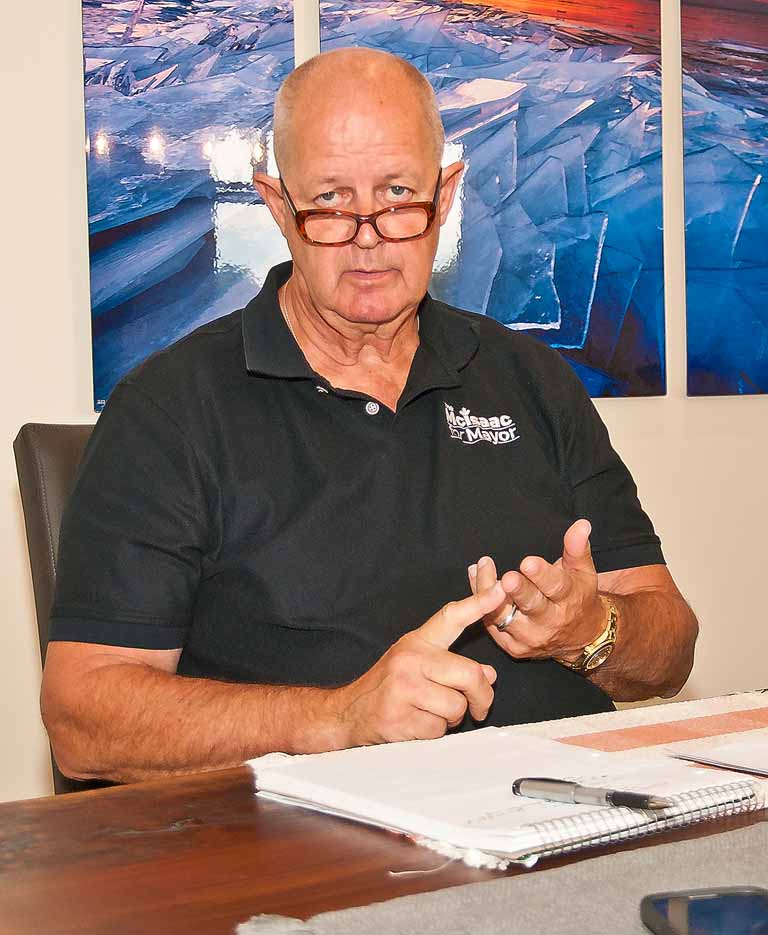
“I think there’s a lot the municipalities can do. I take your point, a lot of this is at the provincial and federal level. We can advocate, we can say this is our idea. We certainly need the federal and provincial levels to understand Orillia’s needs, to understand the impact of their decisions on us, and understand how we can help each other. In the first 100 days I would get non-profits together, real estate developers, planners and say, you have ideas? Like I say the solution is within the community, what are your thoughts?.”
He thinks one area where the municipality might have a card to play is with the permit process.
“People complain about building permits. It takes me 9 months to get a building permit. Why is that? To put a shed in the back yard shouldn’t take me 9 months.” McIsaac said. Recently, a planning meeting needed 40 pages of report to add laundromat as permitted use for one property, and 73 pages to expand a use of an office building beyond medical office – both of which required several people to investigate and write reports on – time and money used for all concerned.
“Moses (had) the Ten Commandments, how do you get to 70 or 80 pages? I don’t like bureaucracy. Sometimes it’s necessary and protects you, but I think there’s things we can do. We need to help people who are homeless. Warming shelters is an example, that’s a great thing. We don’t leave people out in the cold. That’s just not negotiable. We just don’t do that.”
“The province has got an initiative to cut red tape. I think cutting red tape is absolutely important. There are rules, but make it easier verses the 9 months. I think if you look at the expansion thing. There’s a lot of property in Orillia that’s just not being used. I think we could probably use it. If people are buying something and they’ve got it for 15 years, maybe we should try and pressure them into using it.”
“We need to get more purpose built, we need more affordable housing. It’s just something we have to have. There’s ways to do it. We can’t do everything, but every bit helps.”
Provincial Meddling
The province recently proposed legislation to give the mayors of Toronto and Ottawa more executive power in the style American mayors have. Since our conversation the province added more than a dozen other municipalities to their list of cities to get new powers. No one was asking for it, and it can be argued it will lead to abuse. What does McIsaac think about this if Orillia gets added to the list?
“Absolutely (regarding potential for abuse). This is Ottawa and Toronto, we need to be in a place where we can watch what we can control. A mayor in Orillia has very limited power. They have one vote, they can assign people to committees, but they can influence. I think that’s where my strengths come in, because I’m good at influencing people, building teams, getting coalitions, getting compromise; I’ve done this stuff all the time, there’s five things you want and you’re not going to get them all. I’d rather have three things than zero, try and work it out,” McIsaac said. “It doesn’t look like it’s affecting Orillia, so it’s not a concern of ours. Suitable housing is a high priority, so we’ve got to work on that stuff.”
Healthcare
Again, municipalities have a limited role solving the problems most people complain about. There is on area – the needless and expensive competition between cities for doctors – where places like Orillia can play a role.
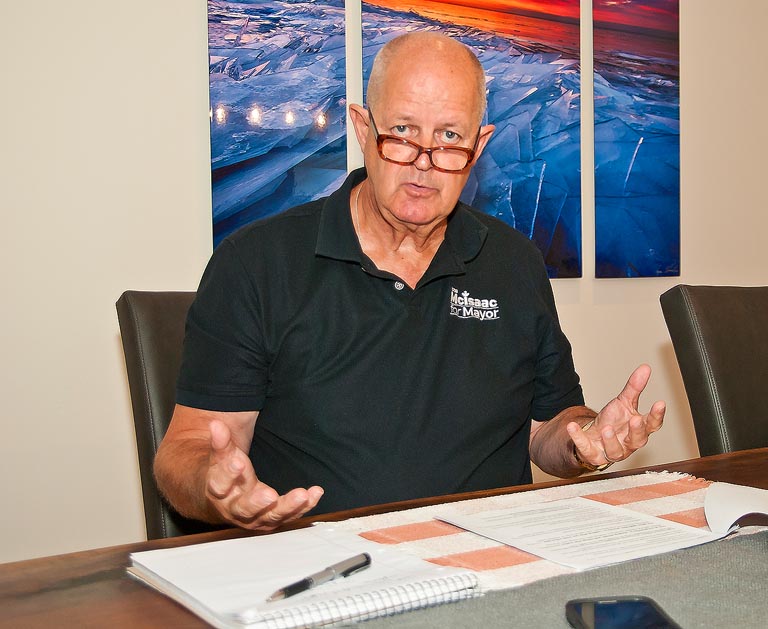
“Legislatively it’s not part of the City’s mandate, it goes to the province, so we need to keep that in mind. But we can advocate. The province has agreed that as of January 1 they will allow pharmacists to treat certain scripts. Right now there’s, from what I understand, 3,000 people in Orillia who do not have a doctor. That’s not good. If you need a doctor you go to the emergency ward. If you have an earache, why can’t you go to a nurse? Pharmacists are all trained people; they should be able to deal with this stuff. They do shots now for COVID and Flu, let’s expand that a little more. I think we can push the province to do more. We (also) participate in the Orillia Soldiers’ Memorial Hospital Board,” McIsaac said.
“There’s six more doctors who will be retiring by the end of ’23. If that’s the case and they are not replaced, we’ll have over 10,000 who don’t have a doctor. That’s a third of the population and that’s just not acceptable. To replace those six we probably need 10 or 12. Let’s go do that.”
We also have opportunities on physician recruitment. Getting an office set up and all the administration of the building, they don’t teach that in medical school. So maybe if we had an office set up and a physician had access to three rooms, where they had a support staff there we could help fund and they could pay for, make it easier for them to come here. Some communities offer funds for doctors for retention. I don’t think that’s the right thing. I think Orillia’s got an awful lot to offer people and I think if we advertise ourselves, market ourselves in the right way we’ll get it done.”
Most people are aware there has been work done to build a new hospital. One concern SUNonline/Orillia has is any attempt to locate one on the west side of Highway 11 because it’s somewhat cheaper to build in a farmer’s field ignores the potential tens of millions of dollars cost to the community to deal with the hole left behind with an empty hospital building and countless vacancies as the rest of the medical services community relocates to be near a new hospital. Will McIsaac do anything to keep a new hospital in the core of the City?
“We need to stand up and say what’s right for Orillia. Council needs to do it’s due diligence and understand the implications of the endeavour and act accordingly. There’s a lot of argument that it should be within the bands of the highways and there’s property there and we should just put it there and do it. Unfortunately we don’t have the funds to do (it) and we’re not even on the list to get there. There’s been a lot of studies on the different spots as well,” McIsaac said.
“Orillia needs an acute care hospital and that’s important. The cost of the hospital though is also important. It’s going to cost close to $1 billion. Orillia’s share of that will 10%, plus we have to buy the equipment, so we could be looking at a $200 million bill. That’s $6,500 for every man, woman and child in Orillia. It’s important council does its due diligence and understand the implications of all the decisions. One decision is to do nothing. Does that work? The hospital is old, it was built in 1911.”
“We do need to look at a new facility. Unfortunately, Orillia Soldiers’ Memorial did not receive any stage two funding, so there’s no pixie dust for Orillia, We have to do whatever we can to get on the list and it’s important we look at all the alternatives. The solutions are in the community and we have to look what those solutions are and figure out what’s best for Orillia,”
Climate Change
A new council may not follow the lead of the last when it comes to the newly adopted climate change action plan. Is McIsaac invested in seeing it through?
“Absolutely. The climate change action plan needs to be implemented now, full stop. I think we need to coordinate with the various groups to make that happen,” McIsaac said. Critics attack the cost, ignoring there’s a cost to doing nothing as well. “This needs to be part of what we do for everyday business. It’s part of the 100 day plan I have,”
Administration Leading Council
SUNonline/Orillia has noticed a trend of administration taking too much of a role in council decisions on some items – and we aren’t the only ones to have noticed. Two recent items, Sweet Dreams Ice Cream and the Opera House story pole issue are examples of staff appearing to not be willing to solve a problem with the first, or reporting on flimsy evidence in the second. There have been other instances over the years where staff seemed to be inflexible with council. How does McIsaac think this can be solved?
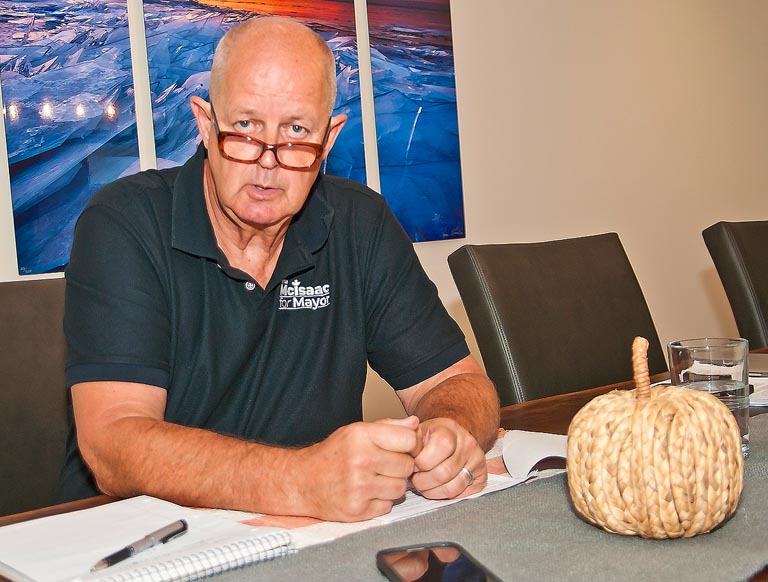
“It’s all about coordination. Mayor and council have the ultimate responsibility setting direction. I’ve got decades of real world experience getting results and how to build teams and motivate people. My focus is going to be on bringing individuals together, staff, council to work together on the problems so we solve them in the right way. We’ve got to start going in the right direction on this stuff. We can’t have people all over the place. I encourage input, I encourage people to make their voice known, but we’ve got to work together. Just because staff says it’s the right way to do something, doesn’t mean we’ve should do it,” McIsaac said.
Another case is the waterfront redevelopment. To date no details have been released regarding how what looks like in the documents available to the public is an inferior project. If there are convincing factors which lead to the decision we should know about them because this project has wide implication for other property and economic development and at a certain point we’re going to have to live with it if it is a mistake.
“It’s difficult to say. A lot of that’s committee of the whole stuff, so people are not able to comment. When I have access and I will as mayor and I will certainly find out. I am committed to transparency. I detest backroom politics or secret deals. Let’s get this in front of the people,” McIsaac said.
We don’t even know if the City got the money back on the value of the land.
“My understanding is, and I don’t have proof of this, is they did. But like you, I need proof. We just don’t have enough information, but we’ll find out.”
One of the problems is council sets policy and policy is a rigid thing, it doesn’t allow staff to recommend, or do what seems obvious, or at worst allows people to avoid doing anything at all. The alternative used by many large organizations is to have practices rather than policy. Practices tend to the routine, while allowing for change when something comes along which wasn’t foreseen, or is new; they are adaptable and not precedent setting (i.e. if one thing is allowed, then all have to be allowed regardless of differentiation). Square pegs don’t have to be forced into round holes. Should and can the City change how it operates in this matter?
“Based on the decades of experience I have. When you go into an organization you empower people. You have to make sure you have the right people in the right spot doing the right thing, then you empower them. You give them ability to make slight deviations. It’s not black and white. It gets ugly at times, but if you have the right people, if you have the right controls in place it can work very well. People need to be agile and nimble. They need to have authority, but most importantly they need to be accountable. I will never criticize anyone for making a decision based on the information they have. We can learn from it. Maybe we should have done something else, but I think we need to empower people.”
“We’ve had situations where your driveway can only be 6 meters wide. What if it’s 6.1 meters? Well, you have to go through this process… Why don’t we just say, “look its close enough, it’s good.” Nine meters, OK, that’s too much, go through the process. A little bit here, a little bit there, you need to be careful, but I think it’s doable.”
“We need to examine that for sure. I asked a question recently and I got a three page response. That tells me they’re hiding something, (or) people don’t know. When it gets to these long explanations when you ask a simple questions it makes you wonder, for sure.”
“I think under the right circumstances, yes. Not everything should come back to council. Council should provide strategic direction, there should be things you say, “Hey, here’s the box you play in, stay within that, if you go a little outside, fine, but in this case do not go outside, watch your budget. That’s a practice, you cannot do anything about that; here’s the practice over here, it’s going to be a little bit different.” There needs to some sort of give and take,” McIsaac said.
Keeping Up With The Cutting Edge
Council has thrown in with something called an Innovation Hub, taking advantage of our college and university expertise, and the brains employed at the OPP, hospital and Hydro One, along with the infrastructure we have going in and out of town to create avenues of employment investment. They also are awaiting a report from staff (which appears staff are not recommending) to involve itself alongside those partners in creating a cyber security group, which aside from the obvious will likely attract jobs. Is McIsaac in favour of making this a priority?
“When I look at stuff in terms of importance, you move the big rocks first. Climate change, food insecurity, housing, those are big things. This is important, cyber/innovation hub, but I think there’s other things. The first 100 days I would look at food insecurity, housing, climate change, I would get to this eventually, but I wouldn’t put it on the first step,”
Downtown
Many people downplay the importance of maintaining a healthy downtown. This ignores its place in the community. It is the heart of Orillia and like our bodies; a sick heart does not bode well. Over the years snow clearing has been scaled back, maintenance of the sidewalks was foregone and in general it looks great from about an inch off the ground and upwards, but it could use a good cleaning and weed trimming – especially before events which attract thousands to Orillia each year. Should the City reverse its attitude and policy to maintaining the downtown.
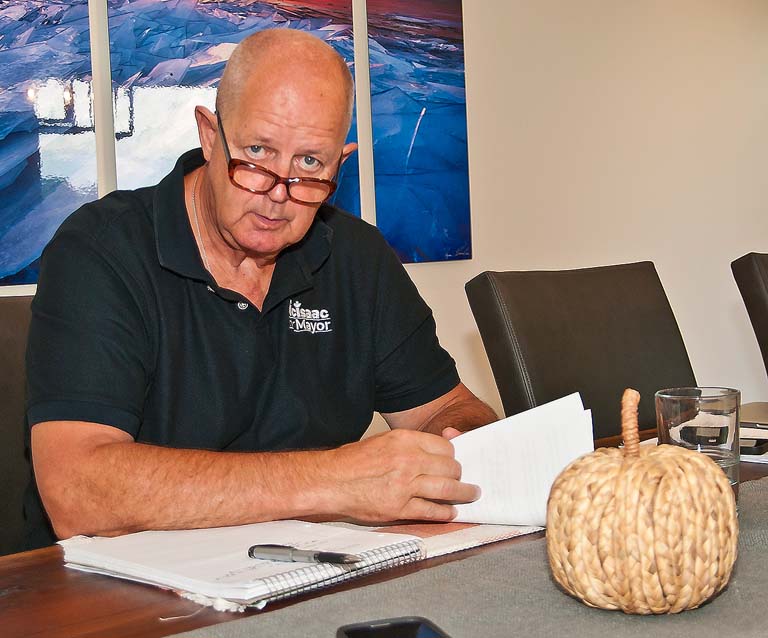
“I don’t know. We’ve got a lot of beautiful things about Orillia, The downtown, the waterfront. I think the downtown is the heart of the city; it’s a vital part of what we’ve got. Visitors come here and its one of the first things they see. It’s important to keep it robust. Having said that, I don’t think it’s the City’s sole responsibility to ensure its future sustainability. I think a group of us in partnership with owners, merchants, the DOMB and the City put skin in the game to make it work. It’s important to the city for sure, but it’s not just the City alone,” said McIsaac. That said he does see the importance of appearance.
“Looking after our City, it’s one of the priorities I’ve set, I think it’s important. We need to take pride in it. I can remember public works driving down the street, they’d see trash, they’d stop and get it, they see weeds, they’d take care of it. We’ve got to do that. It’s important we improve the look of the City. People come here to spend money. Make it easy. Make it look like we take pride in what we’ve got,”
The Last Word
There’s always a burning issue candidates have which doesn’t appear on the run sheet of questions. SUNonline/Orillia has always afforded candidates the opportunity to inject the thing(s) not asked about.
“I’ve set four priorities for my campaign. When you talk to people at the door, what are they talking about? The things that matter to people the most are finding a doctor, the huge cost of living and finding a home, those are the things I hear in the first minute. That’s a priority for me. Looking after our vulnerable – people who have opioid addictions, mental health, homelessness – those are things we need working solutions for. Looking after the City, we just talked about that, improving the roads and infrastructure, and protecting our natural beauty and implementing that climate change plan. It’s also providing good government, spend our resources wisely. Know the difference between an expenditure and an investment. Our budget is $65 million, inflation is 8%. That’s $5 million we’ve got to find to do the same thing we did last year. People just do not want higher taxes. They want services, but you’ve got to be cautious what we pay and values you get. There’s opportunity to improve stuff.”
Voting day is from 10 a.m. to 8 p.m. Monday. There is one voting place in each ward and they are: Ward One – the Masonic Building, 24 James St. E.; Ward 2 – the Orillia Recreation Centre, 255 West St. S.; Ward 3 – Rotary Place, 100 University Ave. Ward 4 – Patrick Fogarty Catholic Secondary School, 15 Commerce Rd.
(Photos by Swartz – SUNonline/Orillia) Main: Don McIsaac is one of three candidates for mayor in the City of Orillia

